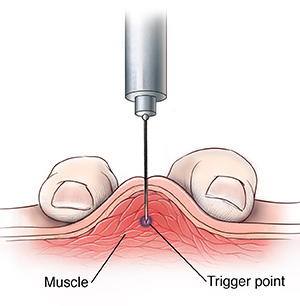Trigger Point Injection: Your Experience
Most trigger point injections are done in your healthcare provider's office. You may be told to stop taking certain medicines before the procedure. Bring test results with you, as instructed.
During the procedure
You'll sit in a chair or lie on an exam table so your healthcare provider can reach the affected muscle.
-
Your healthcare provider will feel and stretch the muscle to find the exact spot of the trigger point. This may hurt, but won't take long.
-
Once the trigger point is found, it's injected. The injection may contain medicine, such as a local anesthetic, which numbs the area. Ask your provider what kind of medicine they'll use.
-
If you have other trigger points, the process is repeated.

After the treatment
You can go home soon after treatment. Take it easy for the rest of the day. The injection sites may be sore for a day or so. Put ice or heat on the treated sites as instructed by your healthcare provider. Ask what medicines are safe to take if you need pain relief. You can return to work the same day or the day after the treatment if your provider says it’s OK.
When to call your healthcare provider
Call your provider if you have:
Call 911
Call 911 if you have chest pain or trouble breathing, especially if the injection was done in the neck, chest, upper belly, or middle to upper back.
© 2000-2025 The StayWell Company, LLC. All rights reserved. This information is not intended as a substitute for professional medical care. Always follow your healthcare professional's instructions.